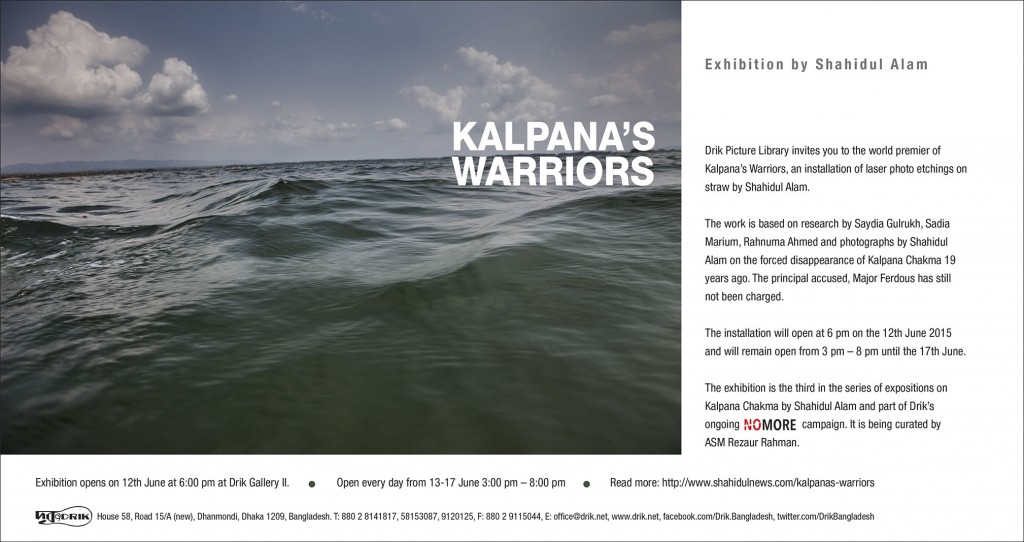Nahida Ashrafi. Photo: Rahnuma Ahmed
Category: exploitation
The Price of Social Distancing
Rahnuma forwarded me Laily’s wrenching FaceBook post. Her father is dying, far away in a UK hospital. Heart breaking, holding back tears, she and her family watch from afar. Unable to touch, to hold, to caress the person who is dearest to them. This is what Corona means in real terms. It was through her research on one of my heroes, the peasant leader Abdul Hamid Khan Bhashani, and later through them staying at the Pathshala Guest House, that we got to know her. Bhashani’s principle of putting nation before self and his simple lifestyle is a very distant reality from the ruling politicians of today. Despite its pain, Laily’s post reminded me of my own dad and my childhood. I remembered dad resting in his easy chair. His belly just the right slope for us kids to use as a living slide. We used to call him bhalluk (bear), and every day as he rested after lunch, my cousins and I would line up behind the easy chair, clamber up to his shoulders and slide down his belly. Mum would freak out, as my dad had osteomyelitis as a child and had never fully recovered. His shins were always exposed and very fragile. Quite apart from wanting him to rest, the idea that we might aggravate his injury worried her. Abba was unperturbed, happy to be teddy bear to a room full of kids. We’d run back to the end of the queue to slide down again. We were always tired before Abba ever did. We didn’t think of it as physical contact in those days. When Abba died, I remember feeling the stubble that had grown on his soft skin, as I stroked him before we laid him down.
Newcomers to Bangladesh are overwhelmed by the generosity of our village folk. They love it when strangers clasp their hands, but are somewhat unsure when seconds, sometimes minutes pass, before their hands are reluctantly released. Years ago, when we at Drik were trying to improve our English skills, we struck a deal with the local office of the British Council. Unable to pay for the expensive English classes, we negotiated a barter. We would do their photography. They in turn, would teach us English. It wasn’t just language skills though, it was learning English culture. One of the first things our English teachers told us was to release the hand quickly! Prolonged physical contact could make the English squirm.
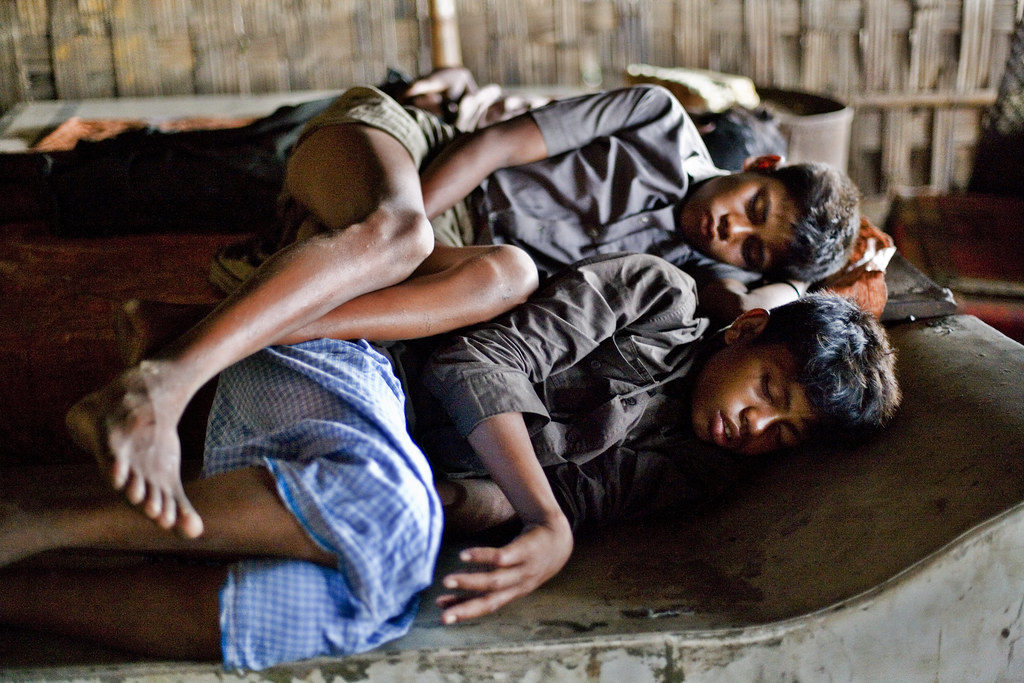
We will not be silenced
“Let us remind you”
They say
These new tyrants
Grown deaf with their own propaganda
Drunk on the spoils of incumbency
And their patrons’ gifts
Blinded by the arrogance
Of too-long
Too-much power
“It is us who brought you freedom
If it were not for us
You would not have the right to write
What you like
To say as you please
To insult us with your poems
Your naked paint
Your twisted tunes and
Crass cartoons
Show some respect”
They say
These bloated 1994 pigs
Ten years late to the Orwellian trough
Fast having made up for time lost
Caricatures of that which once they said they loathed
Would have us silent
In the face of betrayal
Would have us genuflect
To them as lords
When first they promised they would serve
Hear this
You thieves of dreams
You robbers of hope
Who seek to balaclava your looting
With radical rhetoric
That springs hollow from
Your empty hearts
Your false smiles
Your crooked tongues
Ours are freedoms we carry in our hearts
They were not yours to give
They are not yours to take
The freedoms written in our hearts
Will find expression
On the streets
In our workplace
On our stages
In the voting booths
So make your hay
While your sun goes down
For soon our onward march
Will footnote you to history
5-year-old Palestinian schools Israeli soldiers on War Crimes
1-minute video: 5-year-old Palestinian schools Israeli soldiers on War Crimes
5-year-old Janna Ayyad shames Israeli soldiers with Sami Yusuf?s poetry:
All your armies, all your fighters,
All your tanks, and all your soldiers,
Against a boy holding a stone.
Standing there all alone,
In his eyes I see the sun.
In his smile I see the moon.
And I wonder, I only wonder.
Who is weak, and who is strong?
Who is right, and who is wrong?
And I wish, I only wish,
That the truth has a tongue!
The Ruin of Indonesian Society
Indonesia: 50 Years After the Coup and the CIA Sponsored Terrorist Massacre. The Ruin of Indonesian Society

Last year, I stopped travelling to Indonesia. I simply did? I just could not bear being there, anymore. It was making me unwell. I felt psychologically and physically sick.
Indonesia has matured into perhaps the most corrupt country on Earth, and possibly into the most indoctrinated and compassionless place anywhere under the sun. Here, even the victims were not aware of their own conditions anymore. The victims felt shame, while the mass murderers were proudly bragging about all those horrendous killings and rapes they had committed. Genocidal cadres are all over the government. Continue reading “The Ruin of Indonesian Society”
Moving opening ceremony of "Kalpana's Warriors"
Remarkable: Noam Chomsky
Absolutely stunning: Jess Worth. New Internationalist Magazine (Oxford)
We had a fabulous opening with moving recitation of Kabita Chakma’s poem “I will defy” by Aungmakhai Chak, Marium Rupa and Rahnuma Ahmed. Many of the warriors were present in person. We were sad to miss Saydia Gulrukh, but her presence was felt.
I will resist, I shall defy
Will you do as you please?
You turned my home into sand
It was a forest where I stand
You made daylight go dark
Left it barren never a spark
I will resist. I shall defy
You strip me of my land
On my women, your hand
No longer shall I see
No longer will I be
Abandon, neglect, rage
A throbbing womb, my stage
I curl, I tear asunder
Awake, I search, I wander
I am who I am
And I will resist
I shall defy
Poem by Kabita Chakma
Translation by Shahidul Alam
Thanks to Arshad Jamal and Chris Riley for their support and Mohammad Mohsin Miah for helping with the printing. ASM Rezaur Rahman curated the show and the entire teams from Drik’s Publication, Gallery, Photography and Audio Visual Department as well as the volunteers from Pathshala did a wonderful job. We shall resist and we will continue to defy.
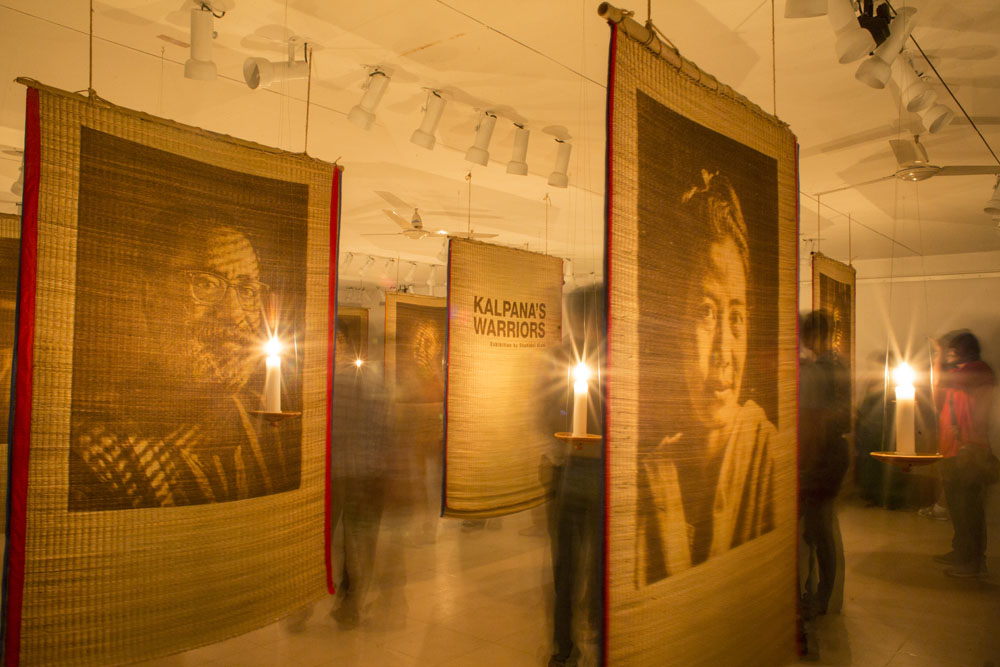
Opening of #kalpanaswarriors at #Drik gallery #dhaka #dhanmondi #photography #bangladesh #cht #rights A photo posted by Shahidul Alam (@shahidul001) on
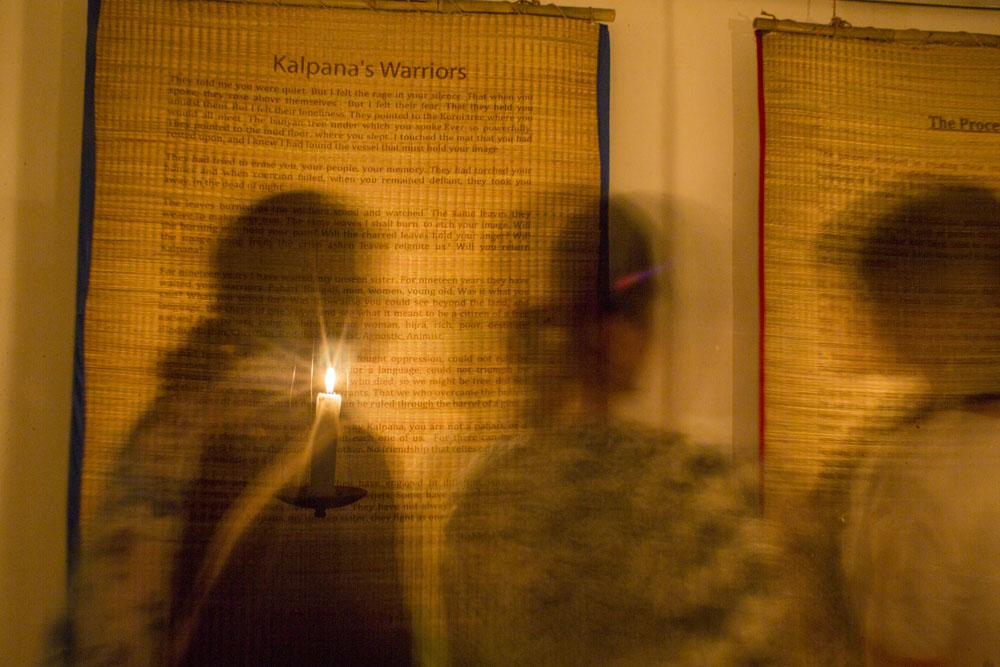
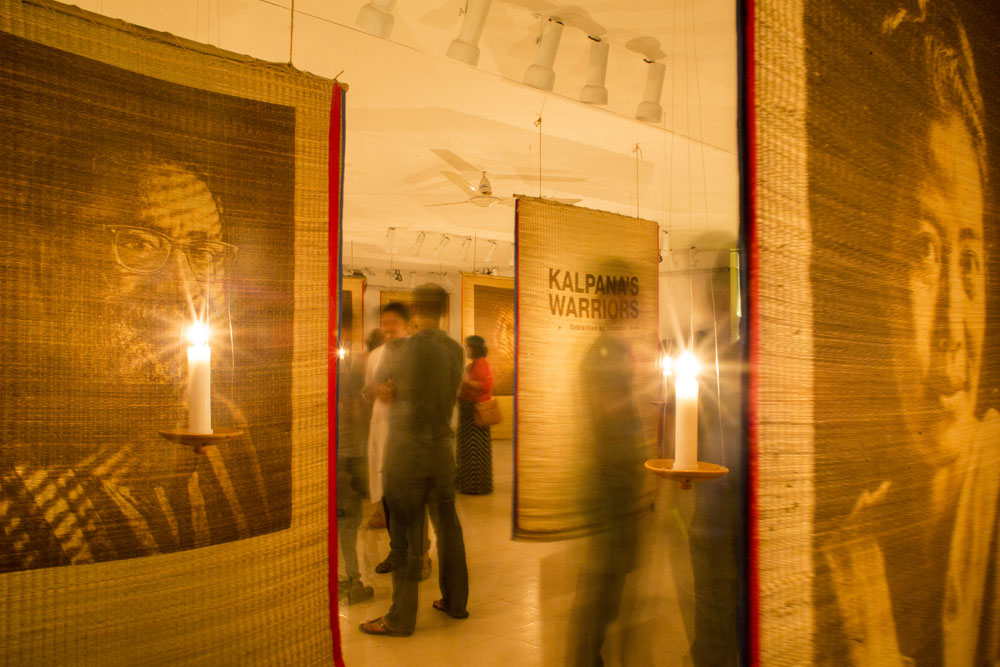
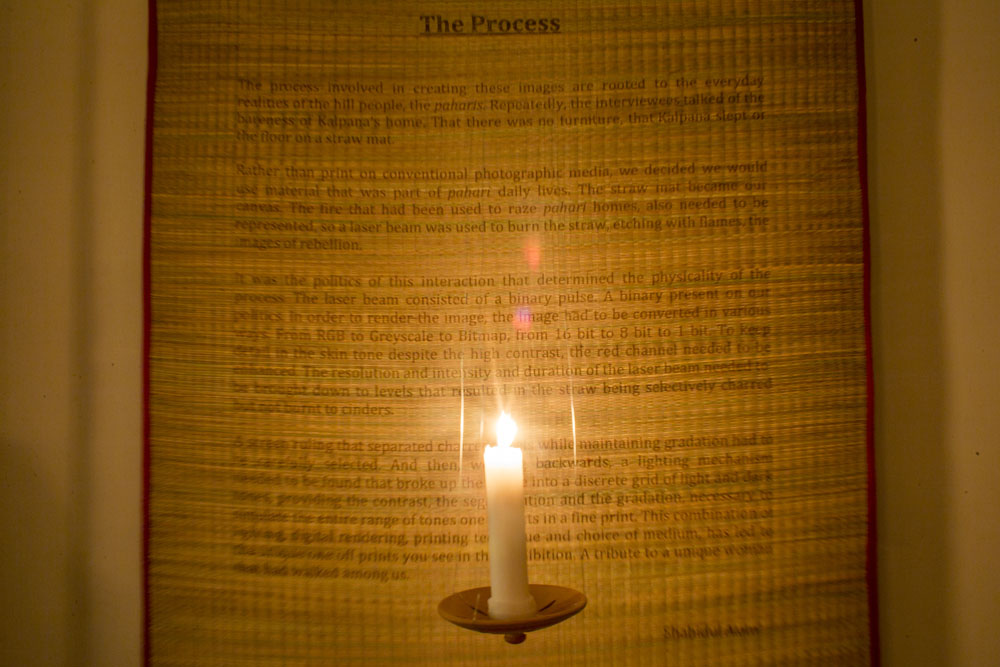
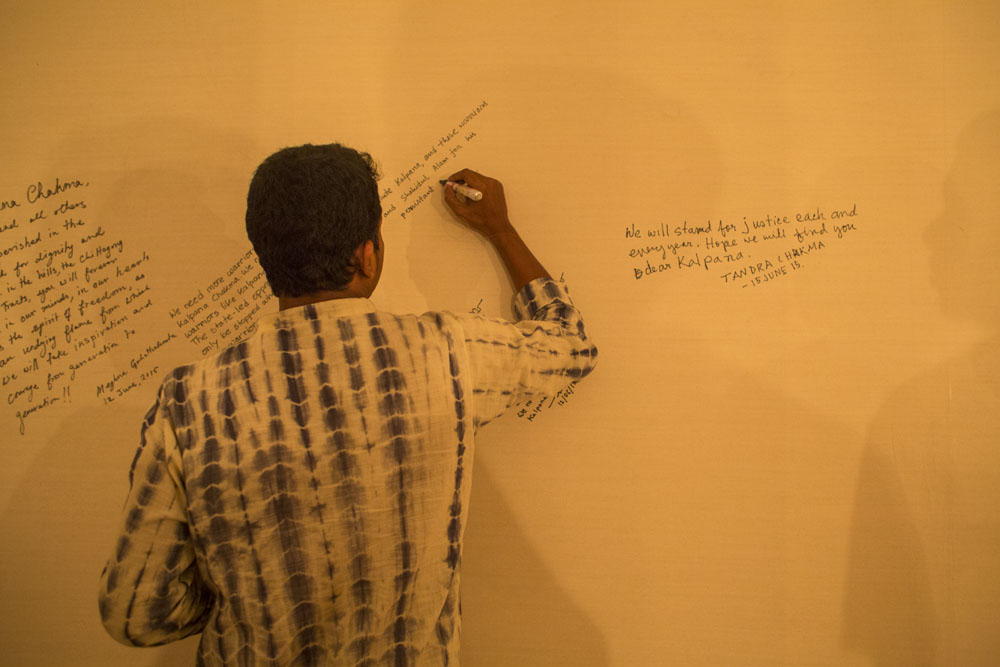
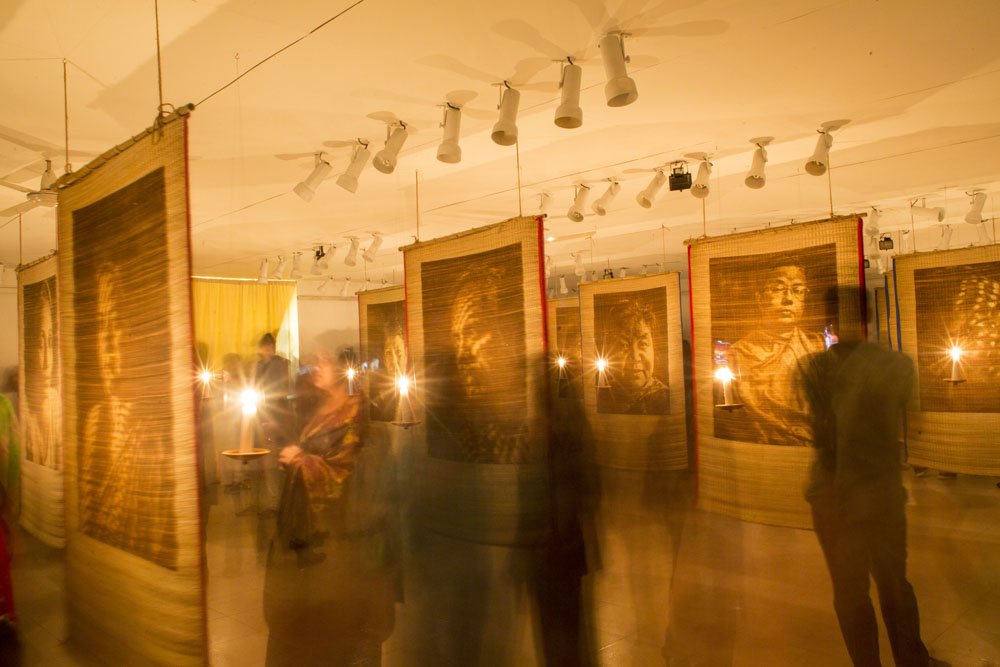
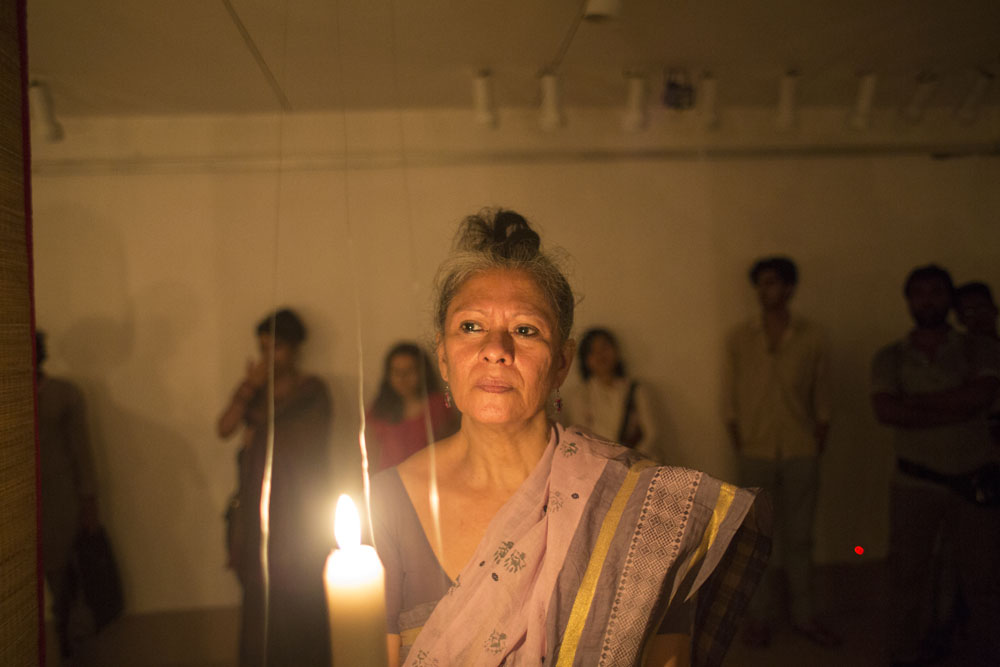
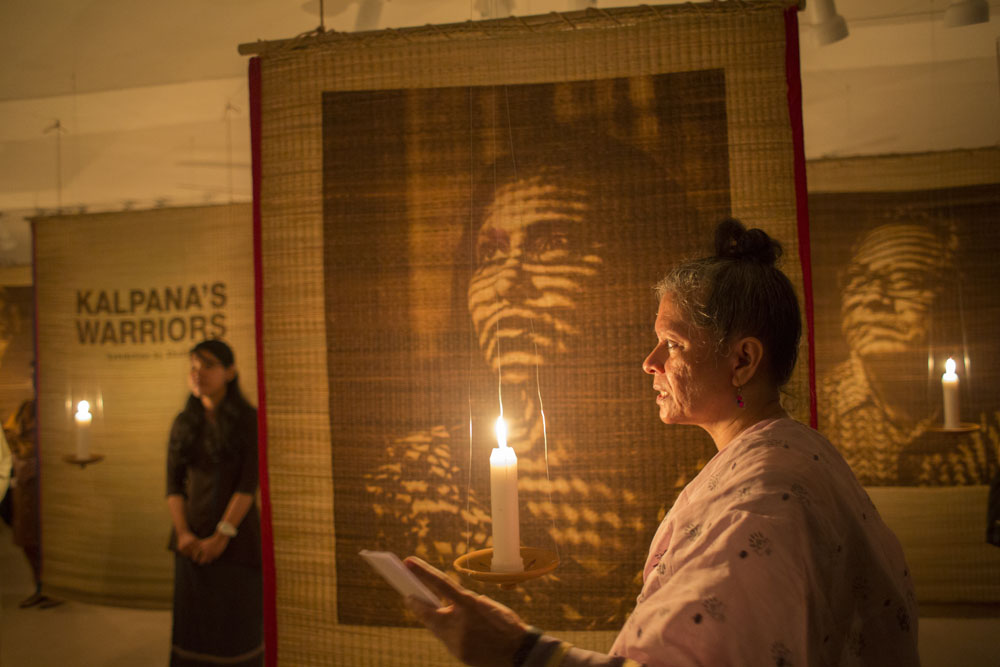
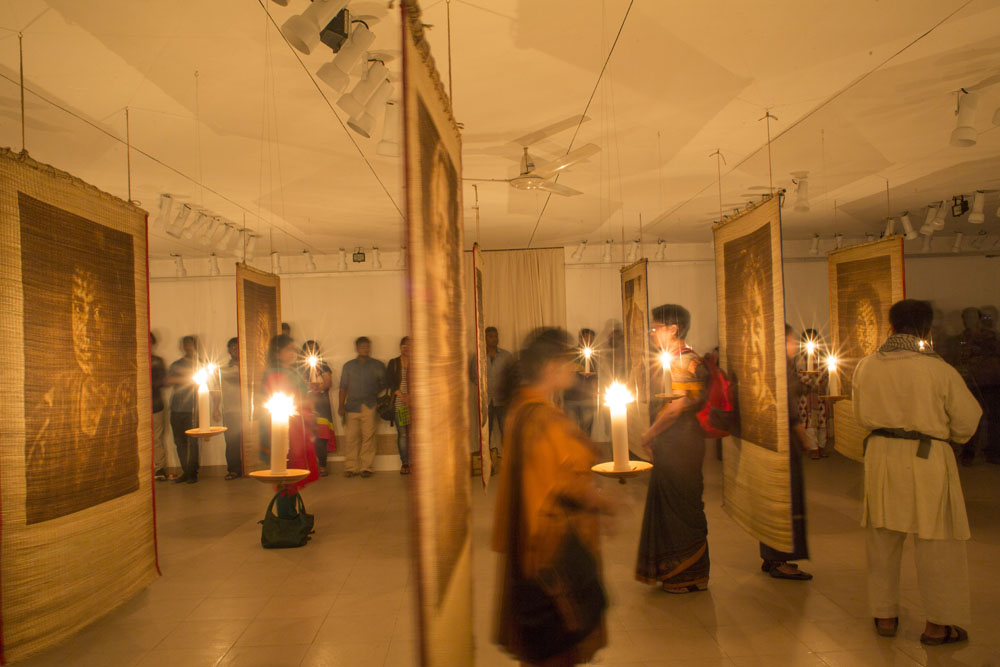
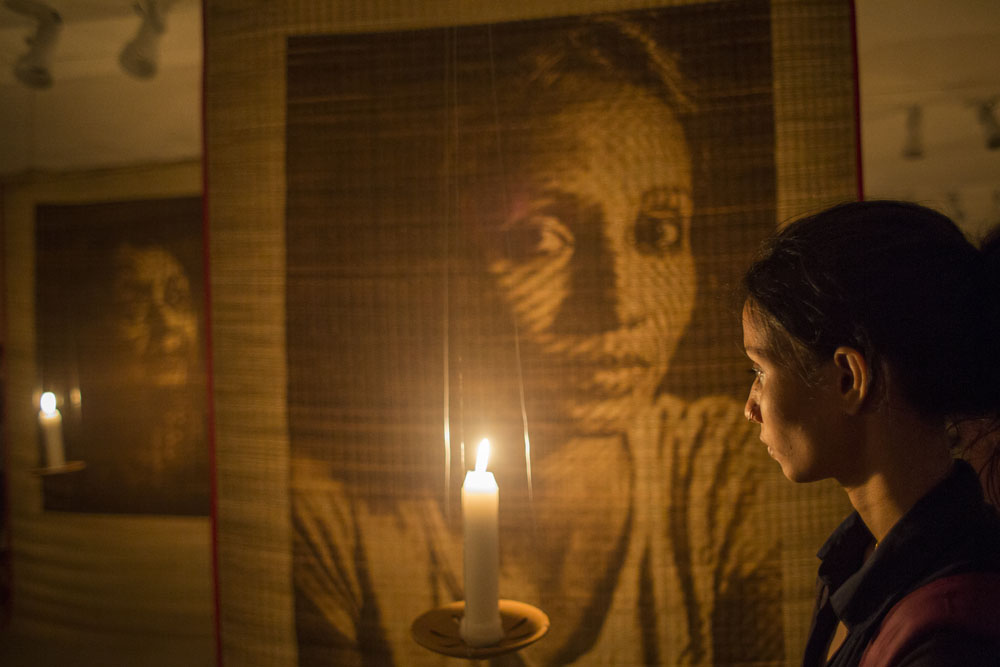
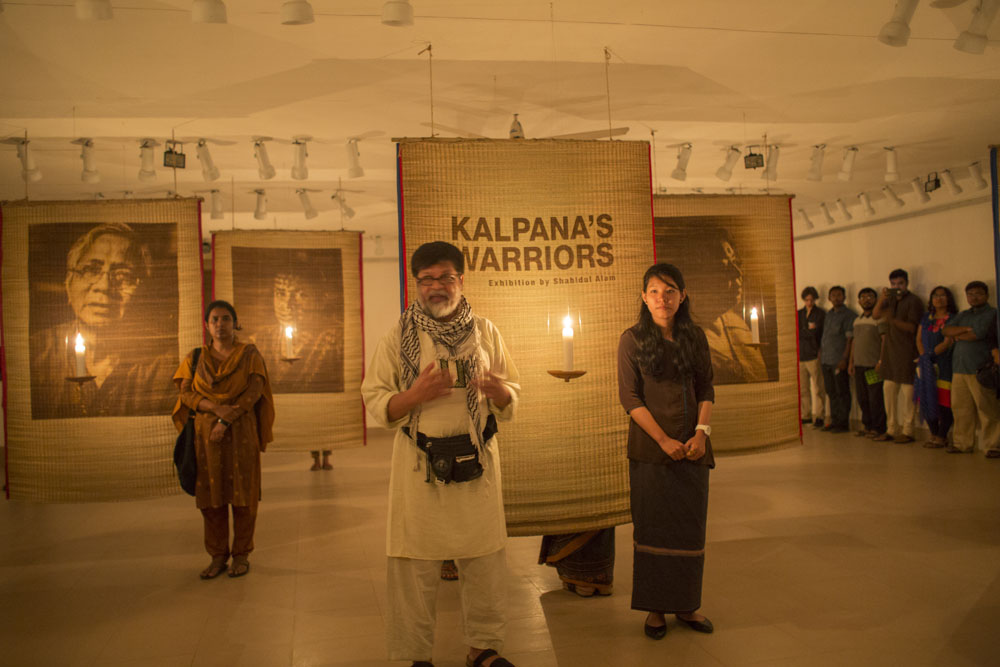
Kalpana's Warriors
Remarkable: Noam Chomsky
Absolutely stunning: Jess Worth. New Internationalist Magazine (Oxford)
They told me you were quiet. But I felt the rage in your silence. That when you spoke, they rose above themselves. But I felt their fear. That they held you amidst them. But I felt their loneliness. They pointed to the Koroi tree where you would all meet. The banyan tree under which you spoke. Ever so powerfully. They pointed to the mud floor, where you slept. I touched the mat that you had rested upon, and I knew I had found the vessel that must hold your image.
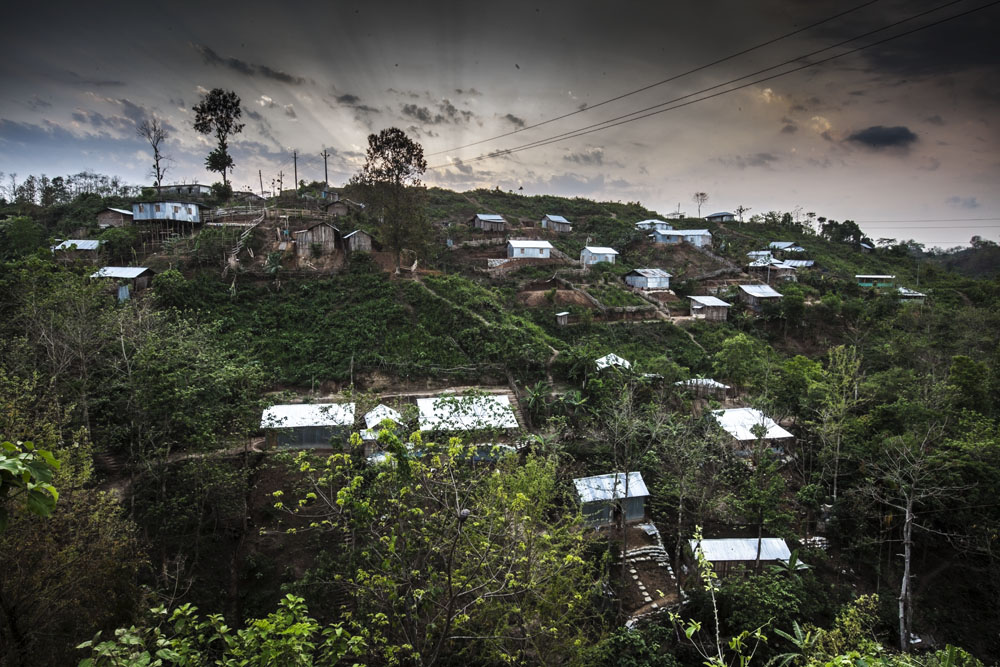
They had tried to erase you, your people, your memory. They had torched your homes and when coercion failed, when you remained defiant, they took you away, in the dead of night.
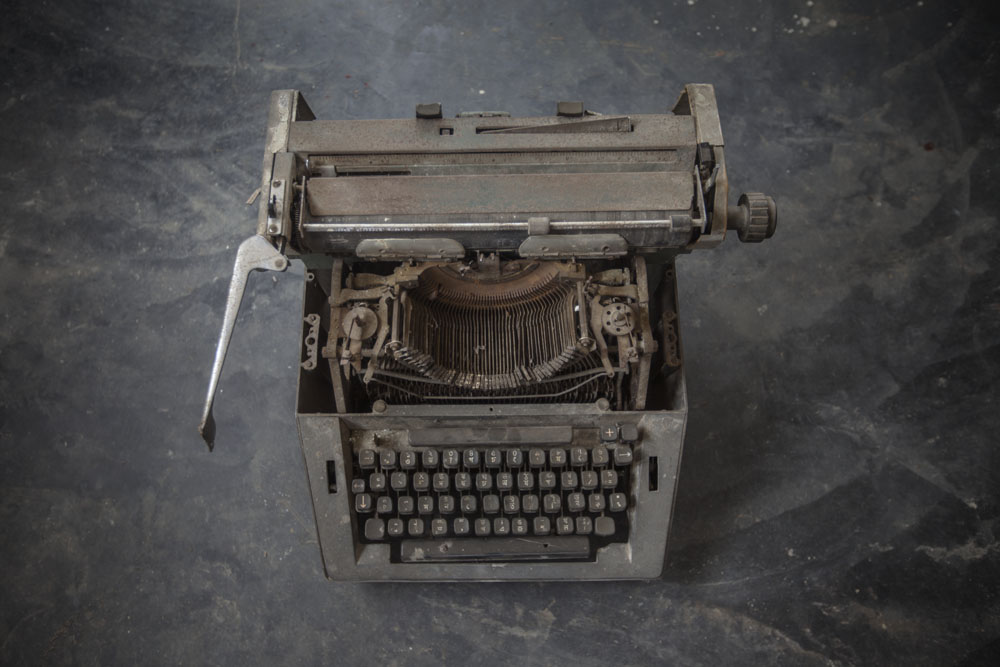
The leaves burned as the soldiers stood and watched. The same leaves they weave to make your mat. The same leaves I shall burn, to etch your image. Will the burning mat hold your pain? Will the charred leaves hold your anger? Will the image rising from the crisp ashen leaves reignite us? Will you return Kalpana?
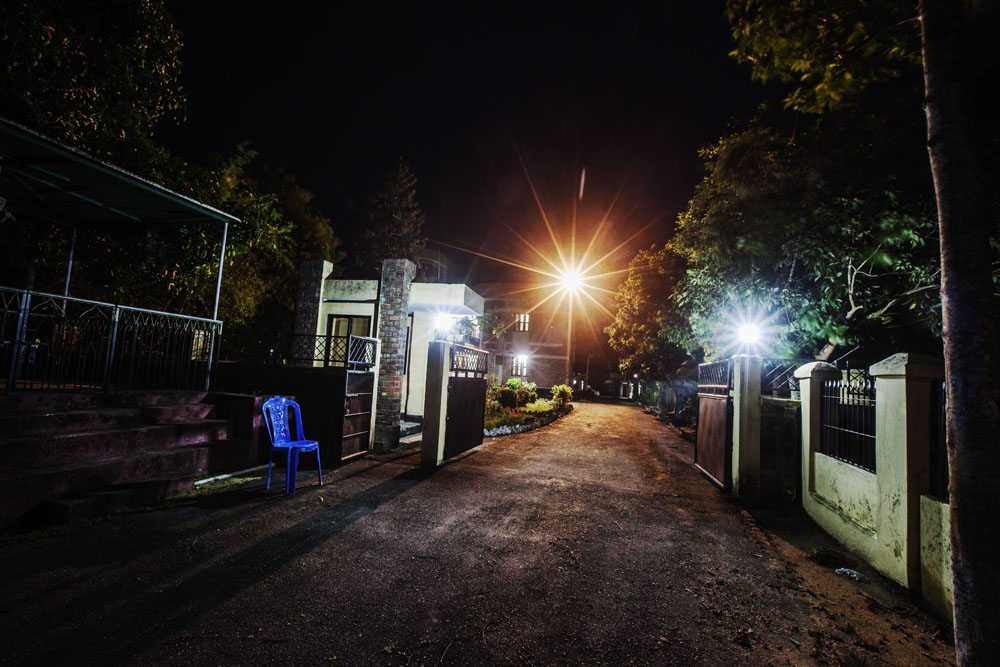
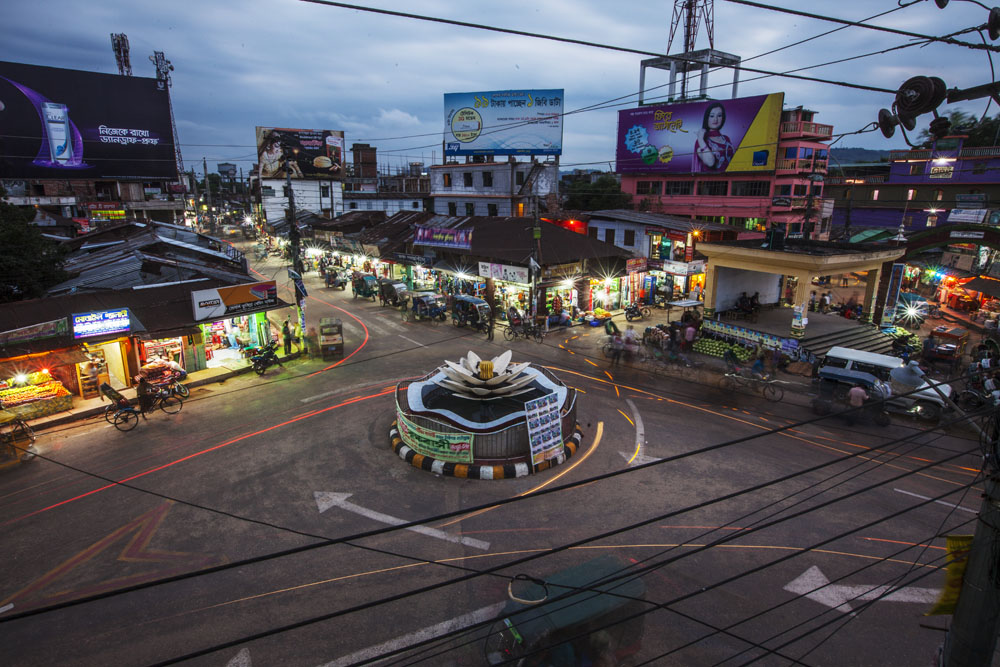
For nineteen years I have waited, my unseen sister. For nineteen years they have waited, your warriors. Pahari, Bangali, men, women, young old. Was it what you said? What you stood for? Was it because you could see beyond the land, and language, the shape of one?s eyes and see what it meant to be a citizen of a free nation? For pahari, bangali, bihari, man, woman, hijra, rich, poor, destitute, Hindu, Muslim, Christian, Buddhist, Atheist, Agnostic, Animist.
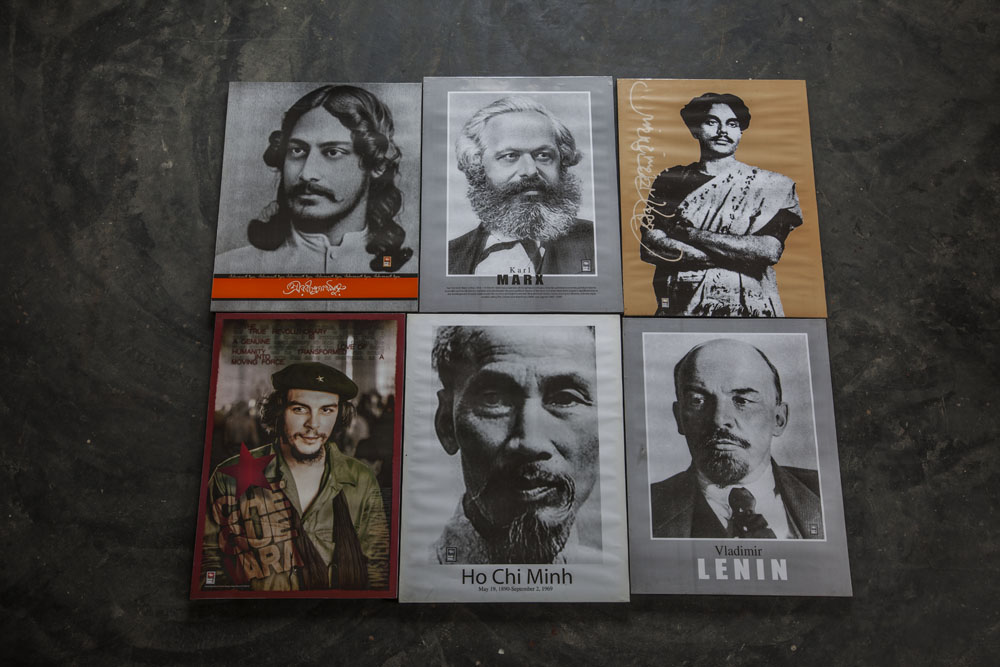
You had reminded us that a nation that fought oppression, could not rule by oppressing. That a people that fought for a language, could not triumph by suppressing another?s. That the martyrs who died, so we might be free, did not shed their blood, so we could become tyrants. That we who overcame the bullets and bayonets of soldiers, must never again be ruled through the barrel of a gun.
That Kalpana is what binds us. That is why Kalpana, you are not a pahari, or a woman or a chakma or a buddhist, but each one of us. For there can be no freedom that is built on the pain of the other. No friendship that relies on fear. No peace at the muzzle of a gun.
These Kalpana are your warriors. They have engaged in different ways, at different levels, sometimes with different beliefs. Some have stayed with you from the beginning. Others have drifted. They have not always shared political beliefs. But for you Kalpana, my unseen sister, they fight as one.
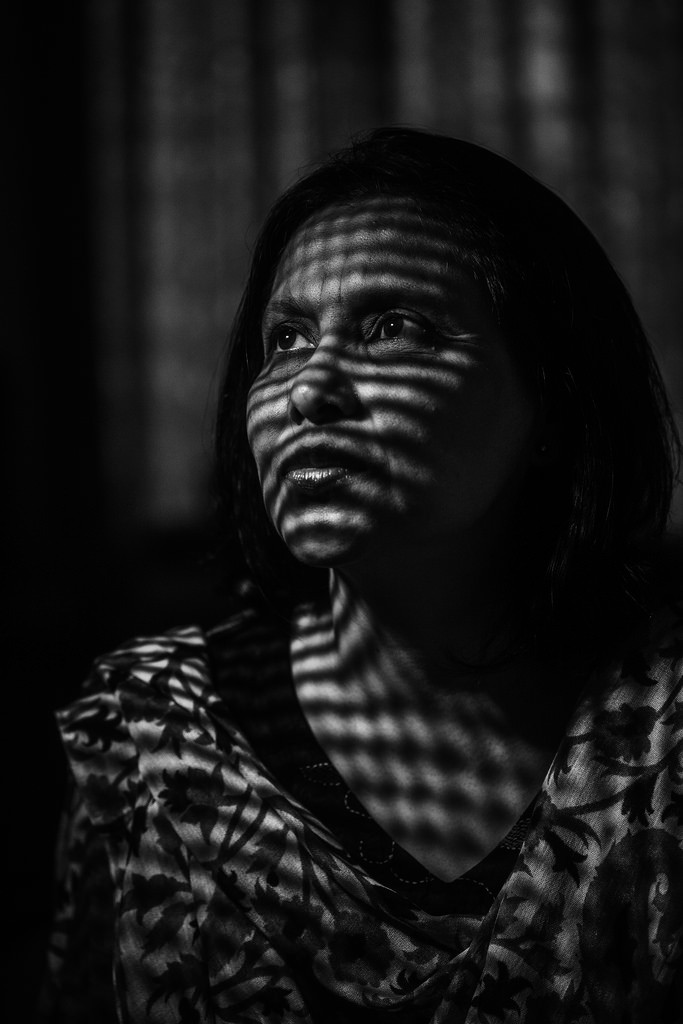
The Process
The process involved in creating these images are rooted to the everyday realities of the hill people, the paharis. Repeatedly, the interviewees talked of the bareness of Kalpana?s home. That there was no furniture, that Kalpana slept on the floor on a straw mat.
Sadia Marium making prints for my upcoming show on Kalpana Chakma #justiceforkalpana #eavig #CHT #military #bangladesh #rights #photography
A photo posted by Shahidul Alam (@shahidul001) on
Rather than print on conventional photographic media, we decided we would use material that was part of pahari daily lives. The straw mat became our canvas. The fire that had been used to raze pahari homes, also needed to be represented, so a laser beam was used to burn the straw, etching with flames, the images of rebellion.
It was the politics of this interaction that determined the physicality of the process. The laser beam consisted of a binary pulse. A binary present on our politics. In order to render the image, the image had to be converted in various ways. From RGB to Greyscale to Bitmap, from 16 bit to 8 bit to 1 bit. To keep detail in the skin tone despite the high contrast, the red channel needed to be enhanced. The Resolution and intensity and duration of the laser beam needed to be brought down to levels that resulted in the straw being selectively charred but not burnt to cinders.
A screen ruling that separated charred pixels while maintaining gradation had to be carefully selected. And then, working backwards, a lighting mechanism needed to be found that broke up the image into a discrete grid of light and dark tones, providing the contrast, the segmentation and the gradation, necessary to simulate the entire range of tones one expects in a fine print. This combination of lighting, digital rendering, printing technique and choice of medium, has led to the unique one off prints you see in this exhibition. A tribute to a unique woman that had walked among us.
Raise Shit
downtown eastside poem of resistance
by Bud Osborn
??the myth of the frontier is an invention that rationalizes the violence of gentrification and displacement?
neil smith 1996
?these pioneers in the gradual gentrification of the downtown eastside say their hopes for a middle-class lifestyle are undermined by the tenderloin scene down the street?
doug ward 1997
?prominent amid the aspects of this story which have caught the imagination are the massacres of innocent peoples, the atrocities committed against them and, among other horrific excesses, the ways in which towns, provinces, and whole kingdoms have been entirely cleared of their native inhabitants?
bartolome de la casas 1542
there is a planetary resistance
against consequences of globalization
against poor people being driven from land they have occupied
in common
and in community
for many years
Pictures that question the world
By?Pawel Kuczynski
ArtFido
Good set, except that Israel is curiously missing.

Pawel Kuczynski?is a Polish artist who specialises in images that make you think hard about the world we live in.
Behind the Gaza ceasefire Israel and Hamas talk potential peace
By James m. Dorsey Nanyang Technological University, Singapore
Synopsis
Israel and Hamas have significantly moderated their attitudes towards one another despite official denials. Indirect talks in Cairo designed to achieve a lasting ceasefire between the two war weary parties effectively constitute negotiations about the parameters of a potential future peace agreement. Continue reading “Behind the Gaza ceasefire Israel and Hamas talk potential peace”

